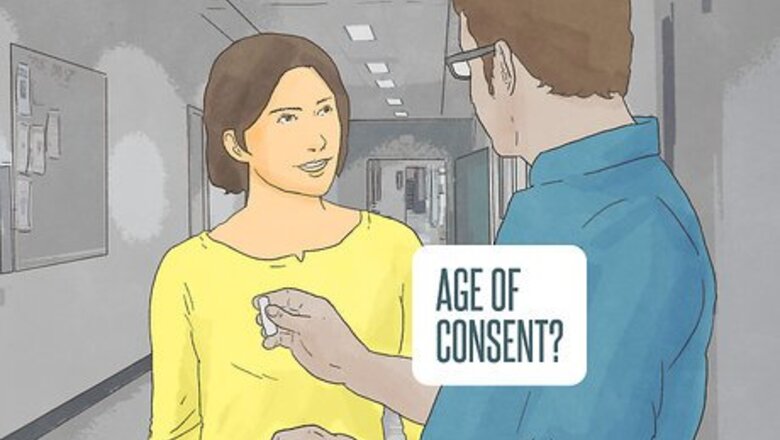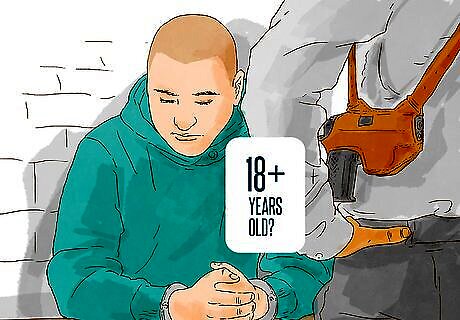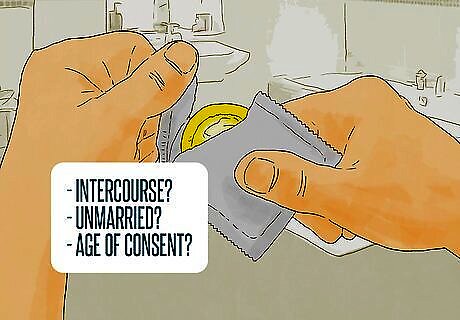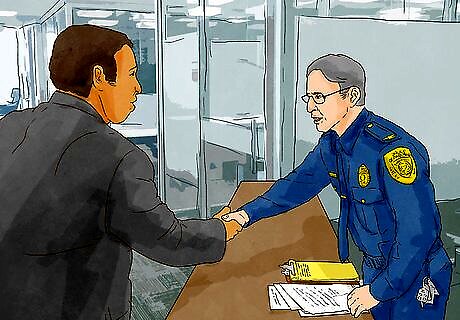
views
X
Research source
Statutory rape laws make it a crime for anyone to engage in sexual contact with anyone below a certain age, unless the two parties are married. If you or someone you know has been a victim of statutory rape, report the crime to the police. You can help the police by providing evidence and testimony that can be used to prove the charges in court.
Reporting Statutory Rape

Check the age of the victim. The "age of consent" varies from state to state. This is the age at which the law recognizes a person's ability to give informed consent to sexual activity. Most states set the age of consent at 16. In other states, the age of consent ranges from 14 to 18. Verify that the victim's age is below the age of consent in your state. You can review your state's penal code by searching online.

Determine the age of the offender. Generally, it is a crime for anyone to engage in sexual contact with someone who is under the age of consent. In addition, many states increase the penalty for offenders who are significantly older than their victims. For example, in California, if the victim is over 18 and the offender is no more than 3 years older than the victim, the offender is only guilty of a misdemeanor. If both parties are under the age of consent, they may both be guilty of statutory rape, depending on the laws of the state.

Verify that the parties are not married. All states generally require that couples be at least 18 years old to get married (19 in Nebraska). However, minors can still marry if they have permission from their parents. If a teenaged couple is pregnant or has a child, they may be able to marry without parental permission, but they may need approval from a court first.

Contact the police. Contact your local police department to report statutory rape. The police will investigate your allegations and report their findings to the prosecutor's office. If the prosecutor decides to file charges, the offender will be arrested. Prosecutors do not pursue every case, and may decide not to prosecute less serious cases, such as consensual sex between two 17-year-olds. Prosecutors are more likely to bring charges if the case involves a large age difference, a victim with a disability, drugs and alcohol, or the abuse of a position of trust, such as a teacher or coach.
Proving Allegations of Statutory Rape

Understand the "elements" of statutory rape. Sexual abuse and assault statutes vary from state to state, but in general, prosecutors need to prove three things: First, that sexual contact occurred (usually intercourse, but some states are more inclusive of what activity constitutes rape); second, that the parties were unmarried; and third, that the victim was under the age of consent when the sexual contact occurred. As you cooperate with the investigation and assist the investigators with the collection of evidence, keep in mind the elements that the prosecution will need to prove. The age and marriage status of the parties will be easy to verify. Most of the investigation will be spent figuring out when and how the sexual contact occurred.

Cooperate with the investigation. The investigation may be conducted by the police, the prosecutor's office, or a special law enforcement unit assigned to sexual assault cases. The investigators will interview the victim and offender separately and try to get a signed statement from the victim and a confession from the offender.

Gather evidence. Teens often keep diaries with records of dates and times of sexual encounters with offenders, or letters written by the offender acknowledging those encounters. Locate letters and diaries, as well as emails, text messages, and voicemails that contain mentions of meetings between the offender and victim. Turn that evidence over to the investigator. Other physical objects that can be used as evidence include articles of clothing or personal possessions belonging to one person found in the home or vehicle of the other. Investigators will seek search warrants to seize evidence of the relationship in the offender's possession.

Locate witnesses. The victim may have friends who were aware of the relationship between the offender and the victim, particularly if the victim confided in those friends. You may also be able to locate people who observed the victim and offender together.

Refute the offender's claims of ignorance. Offenders often claim that they did not know that the victim was under the age of consent. Investigators can cut off this defense by getting the offender to admit that he or she knew that the victim was of school age by asking the offender what he or she talked about with the victim. If you have evidence that can refute such a defense (such as a diary entry stating that the offender picked the victim up from school), provide that evidence to the investigator.



















Comments
0 comment